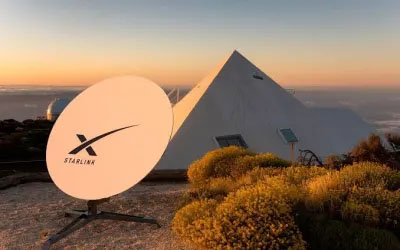MTN Group has launched multiple satellite trials across Africa, with Starlink, AST SpaceMobile and Lynk Global as some of its partners. MTN is running the trials to test the feasibility of different forms of satellite broadband connectivity across the continent. The telecommunications group has partnered with low-Earth orbit (LEO) satellite service providers including Elon Musk’s Starlink and AST SpaceMobile in exploring satellite technology for direct-to-cellular connectivity and backhaul connectivity.
“Multiple initiatives are under way, including upcoming direct-to-cell trials with Lynk Global in South Africa and Ghana. Discussions are also taking place with providers like AST SpaceMobile for trials in Nigeria and South Sudan,” said MTN Group chief technology and information officer Mezan Mroué. “Concurrently, there are ongoing engagements with SpaceX’s Starlink, with enterprise-grade trials under way in Rwanda and Nigeria. In parallel, we are advancing discussions with Eutelsat OneWeb for a planned pilot in South Africa,” said Mroué.
A partnership with Starlink is not possible in South Africa because the American multinational is yet to launch operations here. There has been much speculation regarding SpaceX’s apparent reluctance to enter the local market, including licensing conditions for black economic empowerment, but the company has never given any formal commentary on the matter.
Mobile operators sometimes geostationary satellites for backhaul connectivity, but the satellites’ distance from Earth (around 35 000km) increases latency and the power required to send signals back and forth. Direct-to-mobile connectivity, on the other hand, aims to connect remote subscribers via satellite without them needing to change their mobile device. Vodacom Group CTO Dejan Kastelic was recently quoted as saying that direct-to-mobile satellite connectivity is going to be a “game changer” for mobile telecommunications. “There is a race going on now to see who will be first to provide direct-to-mobile connectivity,” said Kastelic.
Vodacom is following a two-pronged approach similar to MTN’s. For backhaul connectivity, Vodacom has partnered with Amazon-owned Project Kuiper, while its parent Vodafone Group’s 5% stake in AST SpaceMobile is an indicator of its confidence in direct-to-mobile solutions.
A third use-case that MTN is exploring is the use of satellite to connect remote internet-of-things devices to its network. The mobile operator has partnered with Washington-based Omnispace, a company founded in 2012 that has made significant inroads into space-based IoT networks and 5G.
“The companies will explore combining MTN’s terrestrial mobile networks with Omnispace’s non-terrestrial network, leveraging 3GPP standards to service consumer mobile and enterprise IoT services. We will also consider opportunities to work together in developing and growing an ecosystem of devices and software,” said Mroué.
MTN said its partnerships with satellite service providers are mostly based on a shared revenue model, but that each agreement is negotiated on a case-by-case basis.
Despite the promise of broader coverage that satellite connectivity brings, Mroué noted that without stronger smart device penetration, connectivity rates would still remain low on the continent. “As excited as we are by the LEO opportunity, it is important to note that most LEO satellite providers will be offering 4G as the mainstream technology, which means that we need to continue our work to get affordable 4G devices to customers,” he said.


